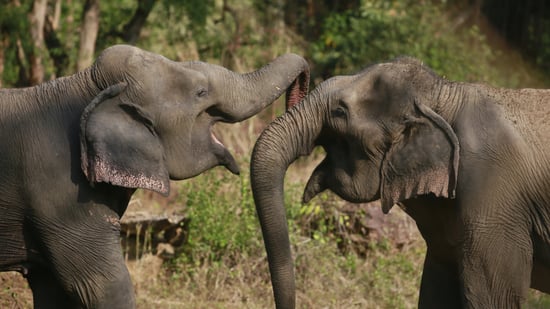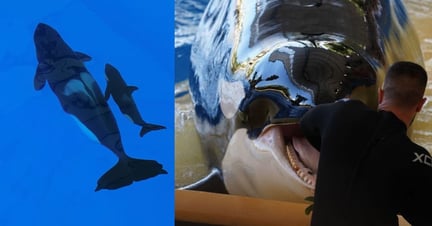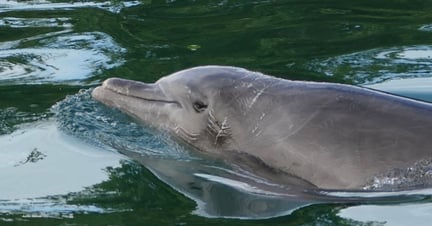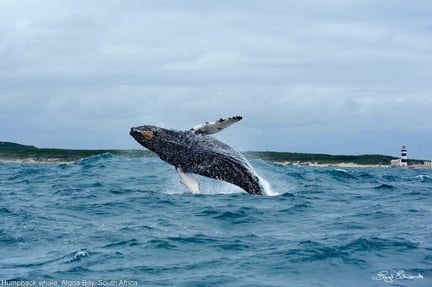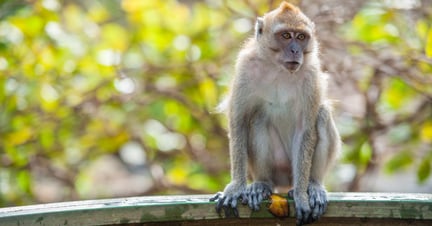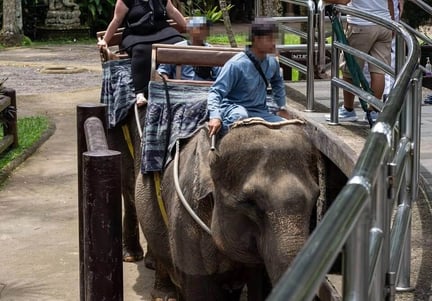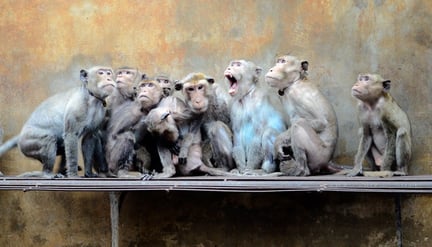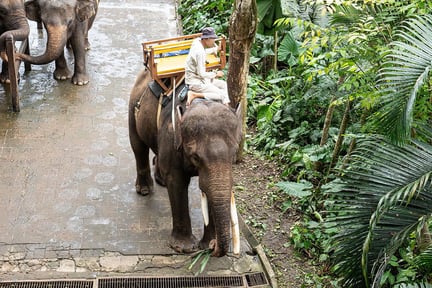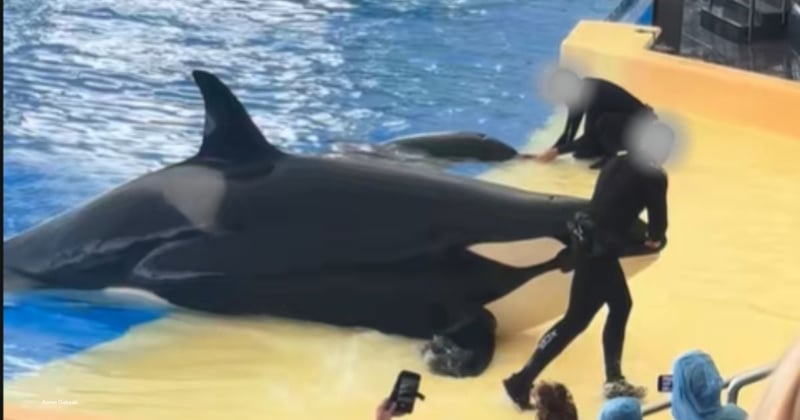
Four-month-old orca calf Teno exploited in Loro Parque shows
News
Concerns rise over the welfare of four-month-old orca calf Teno after footage shows him performing at Loro Parque.
A four-month-old orca calf named Teno, born to the orca Morgan, is already being made to perform in loud, crowded shows at Loro Parque in Tenerife.
Footage shared on TikTok shows Teno and his mother being made to perform tricks in front of a packed stadium, rewarded only with dead fish.
We condemn this as 'lifelong animal suffering' and are calling on travel giant TUI to stop selling tickets to orca and dolphin shows.
TUI breaking its own policy
TUI’s own animal welfare policy states that it does not support attractions that cause unnecessary suffering or breed cetaceans for commercial purposes. Yet, TUI continues to sell tickets to Loro Parque, where orcas are still bred in captivity, including the birth of Teno in March 2025.
This latest case shows that TUI is fully aware its actions contradict its stated commitments. During the company's AGM in February 2025, NGOs raised the issue of captive breeding at Loro Parque. TUI admitted that it allows breeding if it 'supports the natural composition of the group', a loophole that enables them to continue promoting these shows.
By selling these tickets, TUI is not only profiting from the exploitation of Teno and his mother, but also undermining its own public promises on animal welfare.
A lifetime of suffering and confinement
Our 'Stories of Suffering' report highlights the immense suffering captive dolphins and cetaceans endure at venues promoted by TUI. The travel company continues to sell over 400 offers to captive dolphin entertainment venues, fuelling an industry that keeps dolphins trapped for life.
Orca calf Teno, Morgan's youngster, is only 4 months old and already has to perform in front of noisy audiences. Such a young orca is a box office hit: he attracts audiences and brings in extra money for Loro Parque, but also for travel companies such as TUI, which sell tickets for the shows.
This is anything but an innocent family outing. For Teno and his mother Morgan, it means a lifetime of confinement in a barren, unnatural environment. No opportunity to hunt or live in natural family groups, and performing tricks day in, day out in exchange for dead fish.
This is not entertainment, this is lifelong animal suffering.
We therefore ask people: if you love animals, avoid trips involving orcas and dolphins in captivity. We also urge travel company TUI to stop selling tickets for Loro Parque and other dolphin entertainment.
TUI is making money at the expense of animals and contributing to the suffering of this young orca, and other cetaceans.
Loro Parque's long record of welfare concerns
Former trainers, welfare experts, and campaigners have repeatedly documented the harm caused to orcas in captivity, including stress-related behaviours, tooth damage, and social isolation.
Since 2021, at least four orcas have died at Loro Parque.
In early 2025, a Spanish scientific agency rejected proposals to transfer orcas from the now-closed Marineland Antibes to Loro Parque, citing that the facility does not meet minimum standards for space, volume, or depth for the animals.
Public pressure on TUI continues
Over recent years, many animal welfare organisations have repeatedly urged TUI to end its association with marine parks that keep cetaceans in captivity.
Protests have taken place outside TUI offices, at its AGM, and even at travel industry award events, highlighting the company's continued role in supporting this cruelty.
Donate now
When you make a donation, you’ll join a passionate group of supporters who are determined to change the world for animals. We're fighting animal cruelty wherever we find it — are you with us?
Take action
If you care about animals, please avoid attractions that involve captive orcas and dolphins.
Help end this cruelty by signing our petition urging TUI to stop selling tickets to Loro Parque and other marine mammal shows.
Together, we can ensure that calves like Teno are spared a lifetime of suffering.
World Animal Protection opposes the commercial captivity of cetaceans since a captive environment cannot provide the necessary physiological and psychological needs that are critical for the animal's well-being.
Permanent captivity should only be considered for cetaceans that can't be released back into their natural habitat, housed only at facilities that provide the best possible welfare to the captive individuals, ensure no further cetaceans are introduced into captivity through breeding or trade, do not exploit the animals for entertainment, and do not spread misleading claims that misrepresent their needs or justification for their captivity.
Purpose-built sea-side sanctuaries, operating to highest animal welfare standards, should be the preferred option. If these aren't available, maintaining cetaceans in other captive facilities, such as commercial venues, can be considered if strict no-breeding and no-trading policies are implemented, there are no show performances, no direct interaction with visitors, and conditions ensure a life worth living for those animals.
Related content
Morgan gives birth: another orca trapped in Loro Parque captivity
News
Morgan gives birth in captivity as Loro Parque refuses to end cruel orca breeding programme despite growing criticism.
Stories of Suffering: What TUI Doesn’t Tell You
News
TUI markets dolphin shows as family fun, but our Stories of Suffering report tells a different story. See the reality behind the performances.
Whale Heritage Areas
Heritage Sites
World Animal Protection in partnership with World Cetacean Alliance recognise outstanding destinations for responsible wild whale and dolphin watching
